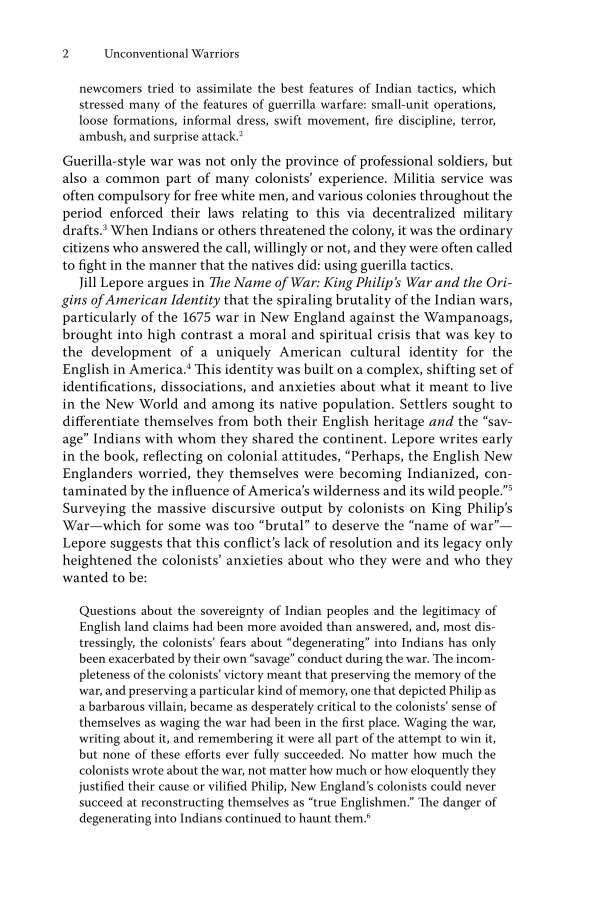2 Unconventional Warriors newcomers tried to assimilate the best features of Indian tactics, which stressed many of the features of guerrilla warfare: small-unit operations, loose formations, informal dress, swift movement, fi re discipline, terror, ambush, and surprise attack. 2 Guerilla-style war was not only the province of professional soldiers, but also a common part of many colonists’ experience. Militia service was often compulsory for free white men, and various colonies throughout the period enforced their laws relating to this via decentralized military drafts. 3 When Indians or others threatened the colony, it was the ordinary citizens who answered the call, willingly or not, and they were often called to fi ght in the manner that the natives did: using guerilla tactics. Jill Lepore argues in Th e Name of War: King Philip’s War and the Ori- gins of American Identity that the spiraling brutality of the Indian wars, particularly of the 1675 war in New England against the Wampanoags, brought into high contrast a moral and spiritual crisis that was key to the development of a uniquely American cultural identity for the English in America. 4 Th is identity was built on a complex, shifting set of identifi cations, dissociations, and anxieties about what it meant to live in the New World and among its native population. Settlers sought to diff erentiate themselves from both their English heritage and the “sav- age” Indians with whom they shared the continent. Lepore writes early in the book, refl ecting on colonial attitudes, “Perhaps, the English New Englanders worried, they themselves were becoming Indianized, con- taminated by the infl uence of America’s wilderness and its wild people.” 5 Surveying the massive discursive output by colonists on King Philip’s War—which for some was too “brutal” to deserve the “name of war”— Lepore suggests that this confl ict’s lack of resolution and its legacy only heightened the colonists’ anxieties about who they were and who they wanted to be: Questions about the sovereignty of Indian peoples and the legitimacy of English land claims had been more avoided than answered, and, most dis- tressingly, the colonists’ fears about “degenerating” into Indians has only been exacerbated by their own “savage” conduct during the war. Th e incom- pleteness of the colonists’ victory meant that preserving the memory of the war, and preserving a particular kind of memory, one that depicted Philip as a barbarous villain, became as desperately critical to the colonists’ sense of themselves as waging the war had been in the fi rst place. Waging the war, writing about it, and remembering it were all part of the attempt to win it, but none of these eff orts ever fully succeeded. No matter how much the colonists wrote about the war, not matter how much or how eloquently they justifi ed their cause or vilifi ed Philip, New England’s colonists could never succeed at reconstructing themselves as “true Englishmen.” Th e danger of degenerating into Indians continued to haunt them. 6
Document Details My Account Print multiple pages
Print
You have printed 0 times in the last 24 hours.
Your print count will reset on at .
You may print 0 more time(s) before then.
You may print a maximum of 0 pages at a time.


















































































































































































































































